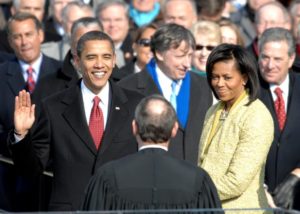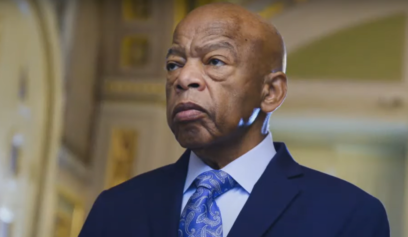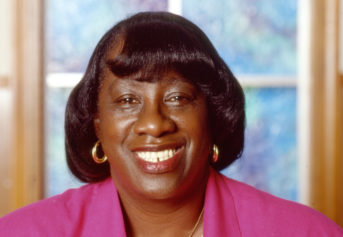What are the 10 most significant historic events of your lifetime? The answer depends on who you are, your racial background and your age.
Pew Research, in association with A&E Networks’ History Channel, conducted a survey of 2,025 adults between June 16 and July 4, 2016, asking them to list the events with the “greatest impact on the country.” For the respondents as a whole, the highest-ranking event by far was the Sept. 11, 2001, terror attacks at 76 percent, with the election of President Obama coming in second place at 40 percent. The tech revolution (22 percent), the assassination of President Kennedy (21 percent) and the Vietnam War (20 percent) follow.
However, the devil is in the details. When broken down by race and ethnicity, the results begin to look interesting. And while there are some similarities across demographic groups, there is some noteworthy, even dramatic, disagreement over what people believe are the most impactful events of our lives. And while some white people would argue that we live in a post-racial society where race simply ceases to matter, studies such as this underscore the ways in which race shapes our perceptions and our reality.
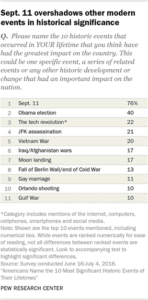
It is surprising that Hurricane Katrina did not make the top 10 among African Americans, given the impact it had on the Black community and the greater significance of the natural disaster exacerbated by human neglect and callousness. Hispanics listed Katrina at No. 9, while whites also did not rank the hurricane in their top 10. All groups believed the Kennedy assassination was among the most significant, but only Blacks believed the assassination of Martin Luther King was among the 10 most important—at No. 5, with Kennedy at No. 4, perhaps reflecting that Kennedy was universally loved among the Black community and viewed as a savior like Lincoln, while Dr. King faced Black opposition at the time of his murder.
In addition, the Civil Rights Movement was of importance to African Americans only, who said it was the third-most significant historic event (18 percent). Many whites are oblivious to race and racism, and the struggle for equality and justice does not register on their radar. Similarly, some Latinos may seek honorary white status, even as the Chicano and Puerto Rican civil rights movements flourished in the 1960s and ’70s. Meanwhile, Blacks were the only group that did not place gay marriage in the top 10. And Hispanics stood alone in naming the Orlando shooting among the top 10 (No. 3), which must speak to the predominantly Latino victims in that act of mass murder.
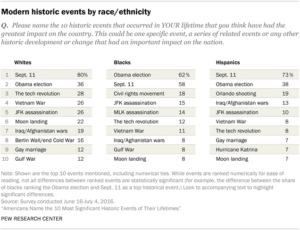
Further, whites concluded the fall of the Berlin Wall and the end of the Cold War was the eighth-most important event in their lifetime, while Blacks and Latinos did not rank the event among the top 10.
The survey also found that people experience history through the lens of their lifetimes. While all generations ranked September 11 as the most significant event, only Millennials placed Osama bin Laden, the Sandy Hook mass shooting, the Boston Marathon bombing and the Great Recession among the top 10. While Baby Boomers and the Silent Generation ranked the civil rights movement and the Kennedy assassination among the 10 most important events, Millennials and Generation X did not. Meanwhile, only Baby Boomers believed the King assassination was among the most historic events of their lives, and only Millennials and Generation X said Hurricane Katrina and gay marriage were top-10 events.
The Pew Survey helps to dispel the myth of a colorblind society. People do not look alike and they do think alike. Their race colors their view of the world, and how they look and live shapes the way they look at history.
